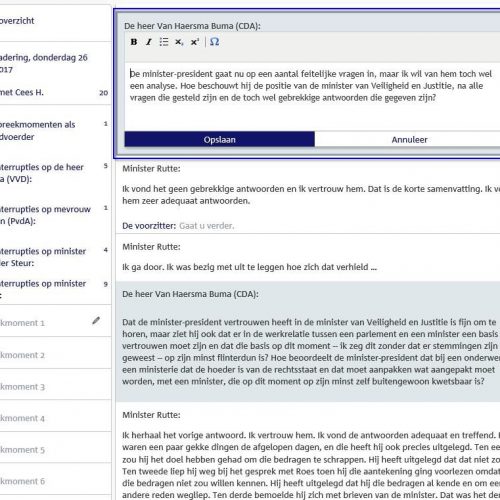Introduction
For the last 10 years, speakers in the Dutch Parliament have been able to submit requests for corrections to their reported speeches via a dedicated website managed by the parliamentary reporting office (PRO). The launch of the website in 2013 completed a digitalisation process begun a couple of years earlier with the introduction of a digital reporting support system (VLOS). The intention was to shift away from paper and towards a more streamlined system but, of course, facilitating the correction request process has also had implications for how speakers approach making submissions and how their requests are handled.
Submission
VLOS is used for reports of plenary and committee sittings in both the House of Representatives and the Senate. After a report has been proofread and the metadata verified, VLOS generates an email to everyone who spoke during the sitting in question, containing a unique link to the correction website. MPs are free to forward the email to staff should they decide to delegate the revising to others. Ministers’ speeches are typically checked by one or more ministry officials. However, a link cannot be used by more than one person at the same time since that would cause the overwriting of proposed changes. It is also worth mentioning that the original email recipient is accountable for the suggestions made under their name.
In addition to the link to the correction website, the email includes a deadline by which proposals must be submitted. All correction requests for plenary sitting reports have to be submitted within 72 hours of receiving the email (Sundays and public holidays excluded). The deadline for committee sitting reports is within five working days. A deadline may be extended on request, to a maximum of 48 hours. After that, the link becomes invalid. Speakers who contact the PRO after having missed a deadline, are given the opportunity to send their suggestions by email.
The website has been embraced from the start by MPs and staff alike. Designed to be as user-friendly as possible, it can be accessed via iPad, desktop or laptop.Speakers can browse through their contributions, which are categorized as speeches or interventions, and change, delete or add text (see the figure below). Each speaker has access only to their own words; the texts of previous and following speakers are shown merely to provide context and cannot be edited. When satisfied, speakers save their revision proposals and close the website, thus completing their role in the process.

Once the correction request deadline for a report has passed, VLOS is instructed to collect the correction proposals. The system subsequently shows whether corrections were submitted and, if so, which speaker has made suggestions and how many. These requests are then assigned to senior reporters, who are responsible for assessing and processing them.
Assessment
The senior reporting team assesses the proposed changes with the help of audio recordings as well as language and editing guidelines. The guiding principle is: “What has been said, has been said”. Corrections should therefore be limited to what is strictly necessary.
Accepted changes may include minor clarifications (without changing the political message), corrections of misheard or misspelled words, or evident slips of the tongue, and additions of words that were said but have been omitted in the report.
Not accepted are additions of words or sentences that were not said (with the exception of the aforementioned words of clarification), or deletions of words or sentences that were said.
To give an example, a Minister at a recent committee sitting promised that the Parliament would receive a certain letter before the summer, a promise that was repeated by the chairwoman of the sitting. A few days later, the Minister’s officials proposed to change “before the summer” to “in the autumn”. It will come as no surprise that this proposed change was rejected since it was not a factual rendering of the words spoken by the Minister.
The PRO makes these decisions independently. Assessing the proposals is usually straightforward. Should there be any doubt as to whether a suggestion is acceptable, the senior reporters may, in the case of committee sittings, consult with the clerk of the committee. Speakers whose proposals are rejected receive an email stating the reasons for this decision, along with an attachment outlining the correction procedure followed by the PRO.
Report versus video
Audio recordings have long been vital to the assessment of correction proposals and justifying the decisions made but, in recent years, another factor has come into play. With the introduction of the video platform Debat Direct, which makes the original, unedited videos of almost all sittings available to the public, one can easily compare the video of a sitting with the corresponding report. Clearly, any discrepancies would be noticeable and might raise questions. Sticking to the words that were spoken is crucial, especially in an environment and era in which transparency has become increasingly important.
Lasting benefits
The correction website enables the later stages of an end-to-end digital reporting, review, assessment and text-finalisation process. It has contributed not only to a more sustainable, paperless, way of working but to a more resilient one, as was demonstrated during the pandemic; the correction system needed no adjustment to allow for homeworking since it was already remote work-proof. We will undoubtedly experience further technological advances over the next 10 years. How much more efficient the process can get, time will tell.
Corinne van Dijk works in correction and publication for the Parliamentary Reporting Office of the House of Representatives of the Netherlands.





[…] Corinne van Dijk:Web-based Revision: How Speakers in the Dutch Parliament Make Correction Requests Online […]